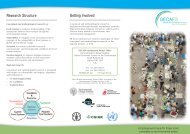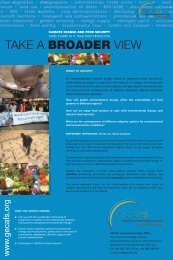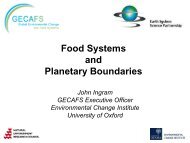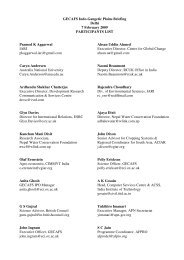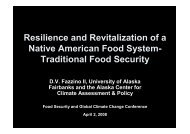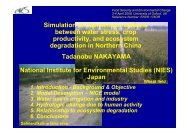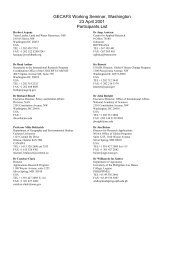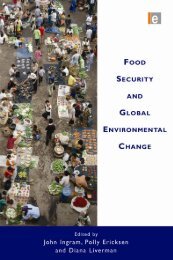organizations made up of numerous national governments, <strong>to</strong> national and local governance structuresin the country in question, agree that there is a problem and understand and concur on its severity.This consensus-building is very difficult and in many situations is often based on the quantitativeremote sensing imagery that provides irrefutable evidence of a significant reduction in foodproduction. Although everyone agrees that political and economic fac<strong>to</strong>rs are usually far moreimportant in determining food access and ultimately food security of a region, it is often thebiophysical evidence that all parties can agree upon as being ‘real’, valid and conclusive. This putsremote sensing at centre stage in famine early warning systems, even in an era of widespreadtelecommunication systems that have greatly increased information availability from remote regions.Once stakeholders agree <strong>to</strong> the nature and scope of the problem and come <strong>to</strong> the table <strong>to</strong> discuss what<strong>to</strong> do about it, then they are able <strong>to</strong> address the underlying political and economic causes of theproblem through efforts <strong>to</strong> engage partners <strong>to</strong> provide income support, clean drinking water, healthinterventions and other responses appropriate <strong>to</strong> the situation in addition <strong>to</strong> food aid.As stakeholders continue <strong>to</strong> increase their attention and focus on food security issues outside of foodavailability, the pressure will grow <strong>to</strong> transform the food aid system <strong>to</strong> provide information on thewider food system’s functioning during a crisis (Okali et al., 1994; Haggar et al., 2001; Brown, 2008).How <strong>to</strong> engage stakeholders in research planningAs noted above, stakeholder engagement is of great importance in the research design phaseand a combination of approaches (consultancies, agenda-setting workshops and informalapproaches) can be employed <strong>to</strong> help set the agenda. Each of these is discussed below.Consultancies. Consultancies, where researchers are hired <strong>to</strong> ascertain stakeholder views,prove particularly effective in determining information need from stakeholders who wouldnot normally participate in, or feel comfortable at, an ‘academic’ brains<strong>to</strong>rming workshop.Examples of stakeholders who would be consulted for regional-level input include seniorpolicy advisors from intergovernmental organizations or regional bodies (e.g. SouthernAfrica Development Community, SADC; European Commission), resource managers (e.g.operations managers of major/trans-boundary irrigation schemes), and representatives fromspecific target groups (e.g. farmer associations or major supermarkets). Careful selection ofconsultants is important: local researchers who are experienced in stakeholder dialogue(rather than international experts) usually have the best feel for the nature of the issues atregional level, and generally have the best contacts (sometimes personal, sometimesprofessional) and hence access <strong>to</strong> interviewees. A small team might be needed <strong>to</strong> collectivelycover the main science areas. A ‘down side’ of this process is that interviewees may notstrongly feel part of a collective agenda-setting exercise, and do not benefit from discussionwith others in a workshop setting.Agenda-setting workshops. These bring the researchers <strong>to</strong>gether with the various stakeholdersand are commonly used in designing research projects. They have the advantage of sharinginformation more openly. Workshop outputs can be seen <strong>to</strong> be a product of collective76
discussion and consensus (as opposed <strong>to</strong> consultancies) and hence can have more ‘standing’.This can be very important both scientifically and politically, especially if a multi-country,multi-disciplinary project is being planned. They can, however, be expensive in cash terms(especially if long-distance travel is involved), and also in time and effort in design, runningand reporting. It may also be difficult <strong>to</strong> elicit attendance from senior stakeholders, such assenior government officials. There is also a risk that such workshops come up with ratherlong ‘shopping lists’ of research needs that are expressed <strong>to</strong>o generally <strong>to</strong> provide the sharpfocus that is needed on the key policy issues. Clear workshop objectives and skilfulfacilitation can overcome this potential problem.Informal approaches. Informal approaches by researchers <strong>to</strong> other stakeholders can play avery important role in clarifying particular issues and helping <strong>to</strong> achieve ‘buy-in’ of keypeople. Important messages can often be better relayed outside the formal environment of aworkshop session or interview. Workshop ‘socials’ and field trips are excellent opportunitiesfor informal exchange, and a relaxed evening <strong>to</strong>gether can be very helpful in helping people<strong>to</strong> get <strong>to</strong> know each other better.It was clear from GECAFS planning exercises that neither consultancies nor workshops alonedelivered a clear research agenda and that some follow-up activities (such as sending drafts <strong>to</strong>technical advisors in regional agencies for their comments) were needed in all the GECAFSregional projects. Although more protracted than would normally be the case for adisciplinary science planning exercise, this process in itself had three important spin-offs: (i)it helped raise awareness of the GEC issues within the policy and other stakeholdercommunities; (ii) it helped raise awareness of the policy and resource management issueswithin the GEC science community; and (iii) it identified, and began <strong>to</strong> build, a cohort ofstakeholders keen <strong>to</strong> work collaboratively.Involving stakeholders in research planning can reveal issues that would be missed by ascience-alone process. A good example emerged in GECAFS early planning discussions withsenior policy-makers in the Indo-Gangetic Plains. There is a policy imperative <strong>to</strong> address themassive seasonal movement of casual labour from east <strong>to</strong> west, which brings considerablesocial upheaval. Hence, addressing labour issues was called for as a component of the GEC–food security agenda for the region, and research questions were developed accordingly(GECAFS, 2008). This dialogue identified a key policy problem that needed immediatesolutions, along with the more general concerns about medium- <strong>to</strong> long-term GEC–foodsecurity issues. It challenged the GEC research community <strong>to</strong> incorporate issues of whichthey were hither<strong>to</strong> ignorant, thereby developing an agenda of greater interest and relevance <strong>to</strong>policy imperatives. In so doing, it considerably increased the need for a larger number ofdisciplines <strong>to</strong> be engaged but this in turn led <strong>to</strong> greater networking.77
- Page 1 and 2:
From Food Production to Food Securi
- Page 3 and 4:
From Food Production to Food Securi
- Page 5 and 6:
Table of ContentsAbstract .........
- Page 7 and 8:
Paper 6: Undertaking Research at th
- Page 9:
AbstractFood security is a conditio
- Page 12 and 13:
2010 about 925 million people had t
- Page 14 and 15:
water) are used, and reduce negativ
- Page 16 and 17:
While the flow of the argument abou
- Page 18 and 19:
determine interactions along and be
- Page 20 and 21:
Paper 3: A Food Systems Approach to
- Page 23:
From Food Production to Food Securi
- Page 26 and 27:
concerns and are now issues that mu
- Page 28 and 29:
the relationships between GEC and f
- Page 30 and 31:
Theme 2 aims to understand how comm
- Page 32 and 33:
GEC and the Food System of the Indo
- Page 34 and 35:
Paper 2: The role of agronomic rese
- Page 36 and 37: These advances have resulted from a
- Page 38 and 39: Crop selection to determine mechani
- Page 40 and 41: Agronomic science is central to imp
- Page 42 and 43: Agronomic research in relation to f
- Page 44 and 45: The discussion above identifies a n
- Page 46 and 47: interventions and political inertia
- Page 48 and 49: While research on producing food ha
- Page 50 and 51: Box 1 Food system Activities and fo
- Page 52 and 53: In addition to broadening the debat
- Page 54 and 55: options. Examples already seen rang
- Page 56 and 57: Figure 3 Outcomes for 10 variables
- Page 58 and 59: Figure 4 Nine ‘planetary boundari
- Page 60 and 61: Figure 5 Environmental change, food
- Page 62 and 63: Table 1: Indicative analysis of the
- Page 65: From Food Production to Food Securi
- Page 68 and 69: Trade Agreement (NAFTA) and the Eur
- Page 70 and 71: Parry et al., 2005). Conducting foo
- Page 72 and 73: is provided in the ESF/COST Forward
- Page 74 and 75: Paper 5: Engaging Stakeholders at t
- Page 76 and 77: into actions (strategies, policies,
- Page 78 and 79: Box 2 Engaging with stakeholders in
- Page 80 and 81: Box 3 Setting the research agenda f
- Page 82 and 83: Third, and of considerable practica
- Page 84 and 85: Figure 2: Organizing and understand
- Page 88 and 89: Elements of good practice in stakeh
- Page 90 and 91: Finally, it is worth noting that fo
- Page 92 and 93: development (Lee, 1999; Gunderson a
- Page 94 and 95: Box 7 The GECAFS stakeholder survey
- Page 96 and 97: ‘break down’ what might be a hi
- Page 98 and 99: Paper 6: Undertaking Research at th
- Page 100 and 101: agriculture in many parts of the wo
- Page 102 and 103: gaps. The presence of a strong tech
- Page 104 and 105: an average of two years to coalesce
- Page 106 and 107: Institute for Meteorology and Hydro
- Page 108 and 109: Identifying case study sitesResearc
- Page 110 and 111: can both benefit from and contribut
- Page 112 and 113: Box 5 Mapping stakeholder interests
- Page 114 and 115: Holding planning meetings in locati
- Page 116 and 117: This reorientation of the debate fr
- Page 118 and 119: Importance of this type of research
- Page 120 and 121: Integrating the food system concept
- Page 122 and 123: awareness of the GEC issues within
- Page 124 and 125: pollutants were then introduced as
- Page 126 and 127: communities operating in food syste
- Page 128 and 129: Improving input-use efficiency acro
- Page 130 and 131: governance focuses on the range of
- Page 132 and 133: Developing research agendas in supp
- Page 134 and 135: The renewed approach to interdiscip
- Page 136 and 137:
BIELAK, A., HOLMES, J., SAVGÅRD, J
- Page 138 and 139:
EAKIN, H. 2010. What is Vulnerable?
- Page 140 and 141:
GODFRAY, H. C. J., BEDDINGTON, J. R
- Page 142 and 143:
INGRAM, J. S. I. & FERNANDES, E. C.
- Page 144 and 145:
LYUTSE, S. 2010. The One Billion To
- Page 146 and 147:
RAYNER, S. & MALONE, E. L. 1998. Hu
- Page 148 and 149:
UNDP 2006. The 2006 Human Developme
- Page 150 and 151:
activities “from plough to plate
- Page 152 and 153:
contribution to the science agenda:
- Page 154 and 155:
urgently needed, and - given the gr
- Page 156 and 157:
GECAFS plannenmakerij stelde vast d
- Page 158 and 159:
ieder hun eigen groep van betrokken
- Page 160 and 161:
het gebied van beheer hebben betrek
- Page 162:
Curriculum VitaeFollowing a BSc in



